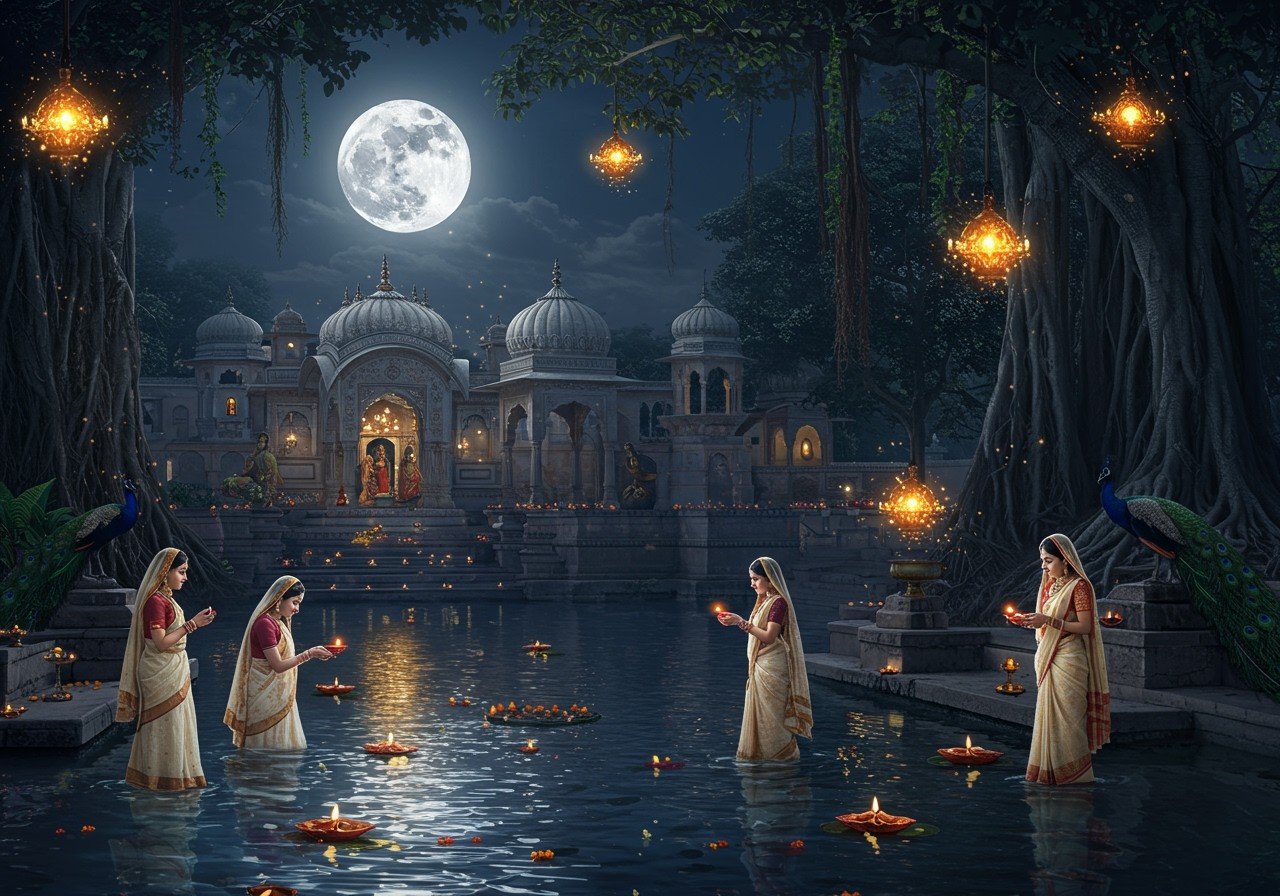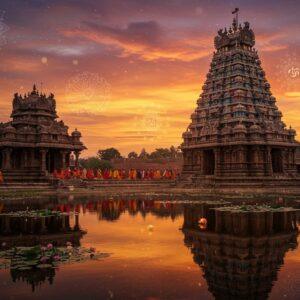
Radha Kund, a sacred water body nestled in Vrindavan, Uttar Pradesh, India, holds immense spiritual significance for devotees of Lord Krishna and Radha. Known for its divine origins and spiritual significance, it symbolizes the eternal love of Shri Krishna and Radharani. Devotees often perform parikrama (circumambulation) around the kund and participate in an auspicious midnight bath. Radha Kund is easily accessible from Vrindavan, approximately 22 kilometers away. This article explores the profound spiritual benefits of bathing in Radha Kund, the significance of the Radha Kund Vrindavan pilgrimage, and the unique customs associated with this sacred site.
The Spiritual Benefits of Bathing in Radha Kund
Bathing in Radha Kund, a sacred act known as Radha Kund Snan, offers numerous spiritual benefits. A dip in Radha Kund is believed to cleanse one of past sins, purifying the soul and fostering a deep sense of peace and spiritual upliftment. The act of bathing brings one closer to the divine love of Radha and Krishna, especially during the auspicious midnight hour of Ahoi Ashtami, as scriptures suggest. Pilgrims often share miraculous experiences and personal testimonies of transformation after bathing in Radha Kund.
Radha Kund Vrindavan Pilgrimage
The pilgrimage to Radha Kund is a journey of devotion and faith. Vrindavan, where Radha Kund is situated, is renowned for its association with the pastimes of Radha and Krishna. Pilgrims often visit during Kartik month, considered the most auspicious period. The pilgrimage includes rituals such as offering prayers, performing kirtan (devotional singing), and participating in sankirtan (congregational chanting). Many pilgrims observe fasts and engage in spiritual discourses, immersing themselves in the rich spiritual ambiance of Vrindavan.
Radha Kund Snan: Rituals and Customs
The ritual of Radha Kund Snan involves specific customs and practices. Devotees traditionally take a dip in the early morning hours, reciting prayers and mantras dedicated to Radha and Krishna. Parikrama, the circumambulation of Radha Kund, is an integral part of the ritual. Pilgrims often carry sacred water back home as a blessing. The Snan is usually followed by offerings of flowers, incense, and other devotional items. Many pilgrims perform the Snan multiple times during their stay.
Radha Kund Me Nahane Ke Fayde (Benefits of Bathing in Radha Kund)
Bathing in Radha Kund is believed to offer numerous benefits: physical, mental, and spiritual. It is said to relieve ailments and enhance overall well-being. The sacred water is thought to possess therapeutic properties, promoting mental clarity and emotional stability. Devotees often experience profound inner peace and contentment after the bath. The spiritual merit gained is considered incomparable, leading to liberation (moksha). The presence of saints and sages around Radha Kund further amplifies the spiritual energy.
Historical and Mythological Significance of Radha Kund
Radha Kund holds a prominent place in Hindu mythology and history. One legend says Radha, in a playful mood, struck the ground with her anklet, causing water to spring forth, creating the Kund. Another legend describes Lord Krishna creating Shyam Kund alongside Radha Kund to balance divine energies. Sacred texts, including the Bhagavata Purana and Chaitanya Charitamrita, extol the glories of Radha Kund. Historical records indicate that revered saints and Vaishnavite scholars have visited and honored Radha Kund, a continuing center of spiritual learning and devotion.
Practical Tips for Pilgrims Visiting Radha Kund
For those planning a visit, consider these practical aspects: dress modestly and respectfully, acknowledging the site’s sanctity. Carry a change of clothes and toiletries for the Snan. Maintain cleanliness and avoid using soap or detergents in the Kund. Be mindful of belongings and avoid carrying valuables. Respect local customs, like removing shoes before entering the Kund area. Engaging local guides or experienced pilgrims can enrich the experience.
Poojn.in: Enhancing Your Radha Kund Spiritual Journey
As you delve into the spiritual depth of Radha Kund, Poojn.in offers sacred items to deepen your devotional connection with Radha and Krishna. Our authentic Astadhatu Brass Radha Krishna Murtis serve as blessed reminders of the divine love that Radha Kund embodies.
We offer premium Radha Krishna Murtis, crafted from pure Pital (brass) and Astadhatu, in various sizes:
- 8.5\” Astadhatu Brass Radha Krishna Murti: A beautifully crafted murti, ideal for personal altars or smaller spaces. Its intricate details and sacred composition make it a powerful symbol of divine love and devotion.
- 10\” Astadhatu Brass Radha Krishna Murti: A larger, statement piece for your home temple, radiating divine presence. Crafted with meticulous detail and blessed materials, it serves as a focal point for your spiritual practice.
Each murti captures the eternal bond between Radha and Krishna, making them perfect companions for your spiritual practices related to Radha Kund. These authentically certified murtis, made with pure materials, are ideal for worship. Visit Poojn.in for our complete collection of devotional items, supporting your connection to Radha Kund’s sacred traditions. We provide secure packaging and delivery across India.
Conclusion
Radha Kund bathing offers a unique blend of spiritual purification, deep devotion, and cultural significance. It’s not just a ritual but a profound spiritual experience, bringing one closer to Radha and Krishna. The sacred waters, Vrindavan’s vibrant spiritual atmosphere, and the rich pilgrimage traditions create an unforgettable experience. By embracing these customs, devotees immerse themselves in divine blessings and the transformative power of this holy site. Whether seeking spiritual upliftment, mental peace, or physical well-being, Radha Kund bathing offers a path to holistic enrichment and eternal connection with the divine.
Parshuram Kund, Arunachal Pradesh: A Spiritual Journey
Parshuram Kund Trip Planning: Your Essential Guide
Parshuram Kund Mela: Faith, Tradition, and History


